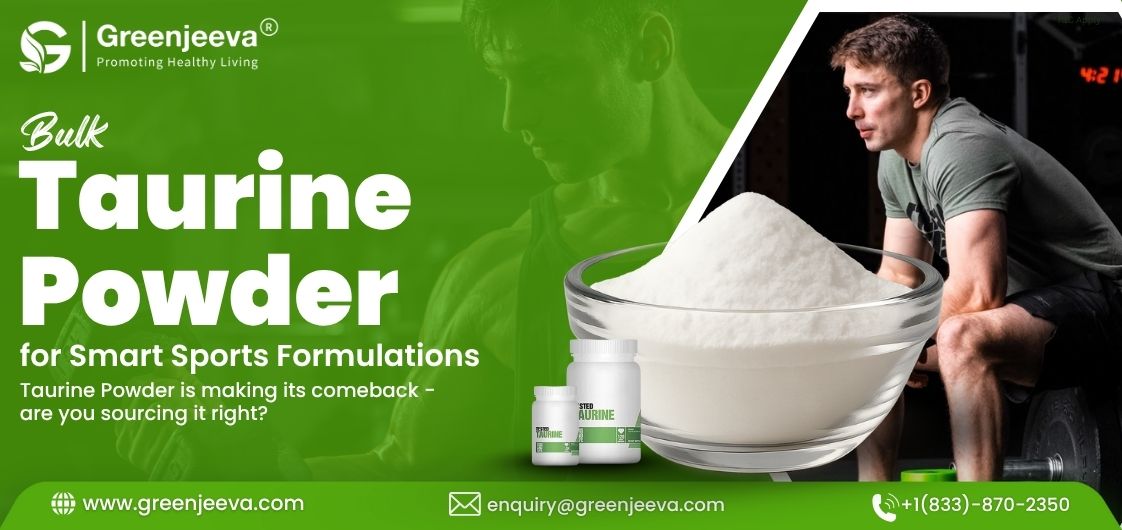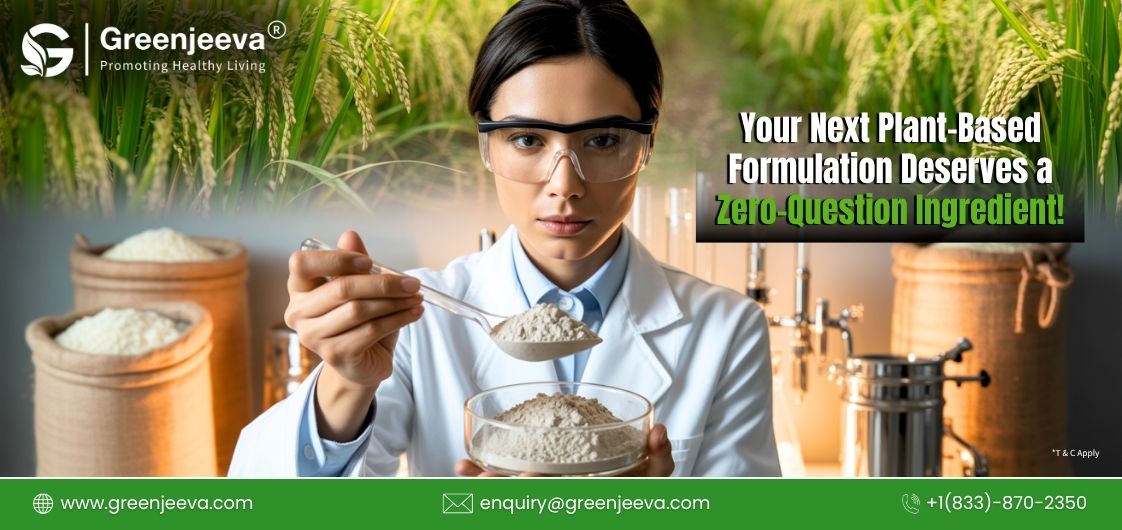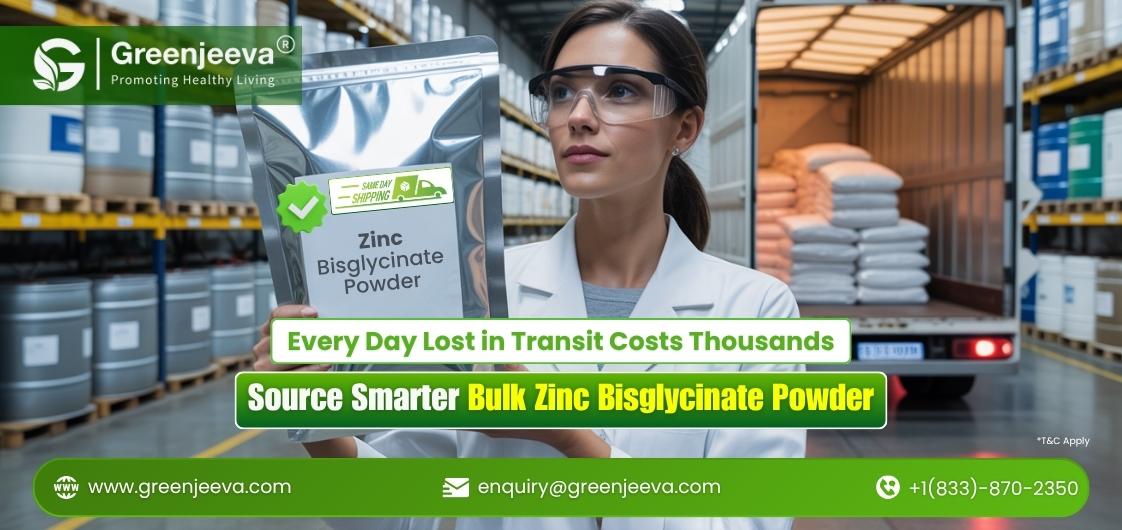Is Taurine the Most Underrated Sports Supplement? Why Brands and Athletes Are Finally Taking Notice

Taurine Powder is one of those ingredients that’s often listed on sports nutrition labels but rarely gets the spotlight. Long overshadowed by creatine, beta-alanine, or caffeine, taurine is now making its way into the strategic spotlight of formulators and functional product developers.
Both bulk buyers and sports supplement brands are re-evaluating taurine not just for its formulation flexibility, but also for its clean-label compatibility and evolving consumer recognition. If you're working in sports nutrition product development or ingredient sourcing, taurine is worth a second look.
What Exactly Is Taurine?
Taurine is a sulfur-containing compound classified as an amino acid derivative. It naturally occurs in the human body and is found in high concentrations in skeletal muscle, heart tissue, and the brain. While it's not used for protein synthesis like most amino acids, taurine plays various physiological roles that have made it a frequent component of sports nutrition products.
Commercial taurine is generally synthetically produced, making it vegan-friendly, non-GMO, and well-suited for brands committed to clean-label positioning.
Taurine in Sports Formulations: Why Is It Used?
Taurine is widely included in pre-workouts, intra-workouts, energy drinks, and hydration formulas. While the exact mechanism behind its growing popularity is multifactorial, there are a few common themes:
- Taurine is often featured in formulations targeting cellular hydration, electrolyte balance, and metabolic support.
- It’s highly water-soluble, neutral in taste, and easy to blend making it compatible with both powder and RTD (ready-to-drink) formats.
- Taurine’s inclusion may be inspired by early research or consumer perception linking it to physical performance and recovery support.
Note for Brands: While taurine appears in products positioned for performance or recovery, any structure-function claims should be vetted for market-specific compliance.
Clean Label Meets Functionality: A Growing Demand
As supplement buyers and athletes become more label-conscious, there's a growing preference for minimalist formulations that don’t rely on synthetic stimulants or artificial sweeteners.
Taurine fits well into this trend, offering versatility without adding bulk or strong flavor. It is also suitable for:
- Vegan and vegetarian formulations
- Sugar-free or keto-positioned products
- Electrolyte and hydration blends
- Post-exercise products with a focus on cellular recovery
More brands are now turning to taurine to round out their amino acid profiles, particularly in formulas that steer clear of caffeine dependency.
Taurine + Other Sports Ingredients: A Functional Fit
Taurine is often found alongside other well-established ingredients such as:
Because taurine does not require a loading phase or staggered timing, it blends easily into various stacked formulations without interfering with dosing schedules.
What Sports Nutrition Brands Should Know About Bulk Taurine Powder
As the infographic highlights, taurine’s versatility and clean-label potential make it a strategic ingredient in modern sports formulations.
If you’re sourcing taurine powder for your next formulation or expanding your sports line, here are key quality markers to prioritize:
1. Purity and Grade
Look for USP or FCC-grade Taurine Powder with ≥99% purity. This ensures it meets global pharmacopeial standards, suitable for dietary supplements and functional foods.
2. Synthetic, Vegan-Suitable Production
Most commercial taurine is synthetically produced and is vegan-friendly, a plus for clean-label or plant-based product lines.
3. Documentation Readiness
Request a complete documentation set from your taurine powder supplier, including:
- Certificate of Analysis (CoA)
- Technical Data Sheet (TDS)
- Material Safety Data Sheet (MSDS)
- Allergen, GMO, and BSE/TSE declarations
This ensures readiness for regulatory audits and third-party certifications.
4. Solubility and Particle Size
Taurine’s fine particle size and high solubility make it ideal for instantized powders, RTDs, effervescent tablets, and even gummies.
5. Third-Party Testing
Check for evidence of testing for:
- Heavy metals (Lead, Arsenic, Cadmium, Mercury)
- Microbial load (Salmonella, E. coli, Total Plate Count)
- Residual solvents and impurities
This is especially critical when exporting to North America, Europe, or markets with strict ingredient safety compliance.
B2B Use Case: Where Bulk Taurine Powder Is Gaining Ground
Taurine’s flexibility has broadened its application across categories such as:
- Sports hydration sticks and sachet
- Stimulant-free pre-workout formulas
- Functional beverages
- Capsule-based nootropic stacks
- Endurance blends for runners and cyclists
Manufacturers appreciate that taurine doesn’t require emulsifiers, has a neutral sensory profile, and meets rising demand for non-hormonal, non-stimulant ingredients.
Bulk Taurine Powder: What Sourcing Managers Should Ask
Before locking in your taurine supplier, here are key questions to guide supplier evaluation:
- What grade and purity are you offering (USP/FCC)?
- Can you provide country-of-origin and production method details?
- Is third-party testing conducted batch-wise?
- Do you offer documentation to support vegan, non-GMO, and allergen-free claims?
- Can you accommodate MOQ flexibility or OEM packaging needs?
Final Thoughts: Taurine’s Time Is Now
As the sports nutrition category continues to evolve, ingredients like taurine powder once overshadowed are finding new relevance. Its role in modern formulations isn't necessarily about being flashy, but about being formulation-smart, compliance-friendly, and consumer-aware.
Whether you're developing a clean-label pre-workout, building a hydration line, or refreshing your amino acid profile, taurine offers an ingredient solution that checks all the right boxes.
Looking for a Taurine Powder Supplier You Can Trust?
Green Jeeva support sports nutrition brands and formulation teams with high-purity, tested Taurine Powder that meets global quality standards.
- USP/FCC Grade
- Allergen-Free, Vegan-Suitable
- Regulatory Documentation Ready
- MOQ & Bulk Options for USA, Canada, EU
[Request a Sample] [View Product Specs]
**The Food and Drug Administration has not evaluated these statements. This product is not intended to diagnose, treat, cure, or prevent any disease. **




.jpg)


